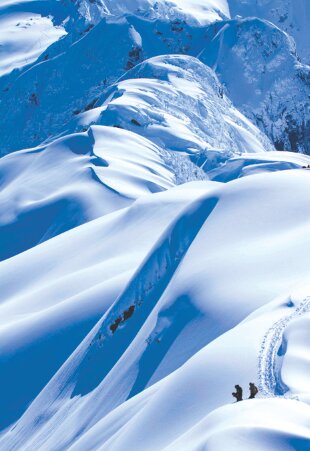 A Dialed Approach
A Dialed ApproachIt’s early October as I write this, and in the last two weeks there have been five skiers and boarders killed in avalanches in South America and the Himalaya.
I’ve been working in the avalanche world on and off for 20 years, and when someone dies in an avalanche we stand up and take note. When multiple people die in several avalanches over a short time period we lose sleep at night. We try to figure out what went wrong and how to improve.
In this recent thought process I decided to come up with some not-so-standard avalanche and backcountry safety tips for those who hit the backcountry near Mt. Baker Ski Area. You have heard some of these and others you have not. Hopefully you’ll find some value in them.
1. Expert skiers and boarders are often not expert avalanche rescuers. Do the math. How much time have you spent riding on snow versus practicing with your rescue equipment? For someone who’s in the backcountry 20 days a year it’s about one hour of practice at best. Annually. But here’s the deal: no avalanche rescue is ever the same. You can’t practice enough with your safety equipment, and you’ll learn something new every time
you practice.
2. Try to have someone in your group who has sound backcountry experience and who will be confident and firm in giving orders and commands. This is someone who will save lives if something goes wrong. It can be tough to pinpoint this person and even tougher to volunteer to be this person without seeming like a dork. Just do it.
3. Smoking pot. Nobody wants to talk about this, but here’s what I suggest: if you’re a backcountry burner you need to have a conversation with yourself and ask, “Will this hinder or enhance my performance in an avalanche rescue and/or in my ability to make good decisions?”
4. Stay with your partners on the up track even if they are slower than you. If they can’t see you and you can’t see them, how do you help each other if something goes wrong? How will you communicate? Space out appropriately for the terrain, of course. If you don’t know about that then it’s probably a good idea to take an avalanche class. Actually, it’s always a good idea to take an avalanche awareness course.
5. Pick your partners wisely. Are they skilled in choosing appropriate terrain for the current conditions? Are they skilled at using their rescue equipment?
6. Know where the keys to the car are, especially if you didn’t drive. For those who use snowmobiles and tow others or ride double to access ski terrain, it’s important that everyone knows how to start a sled, ride it and get out of the terrain.
7. Check in with each other while traveling in the backcountry. A simple “How you guys feeling?” goes a long way. Never assume everyone is comfortable. Maybe some super rad backcountry woman brought her not-so-super-rad boyfriend from Brooklyn along and the dude is scared to death and would rather be playing Xbox in the city.
8. If you sense something is wrong, speak up. If you’re uncomfortable with the terrain or the decisions being made in your group, say something. This can be difficult to pull off and I’ve never understood why. Become a master of your instinct and verbalize if necessary.
9. Be aware of groups traveling above and below you. It’s always a bummer when you’re at the top of something and ready to drop when a group is still traveling below you. The best technique I’ve come up with is yelling, “Hey! Are you guys cool if I ski?” But you’re damned if you do and damned if you don’t at that point. The solution as far as I can tell is to travel a little farther than the popular shots and then this becomes less of a problem. It’s amazing what a little more effort can bring.
10. Don’t be afraid to turn around or go somewhere safer. Always trust yourself.
11. If you think you need to learn more about the backcountry terrain near Mt. Baker and how to stay safe, check out this link and sign up for a course: mtbaker.us/mtn-safety/. The American Alpine Institute and Mt. Baker Mountain Guides also offer avalanche courses. x